Local
Top 10 local stories of 2021
Hate crimes, book bans, and Nellie’s protests
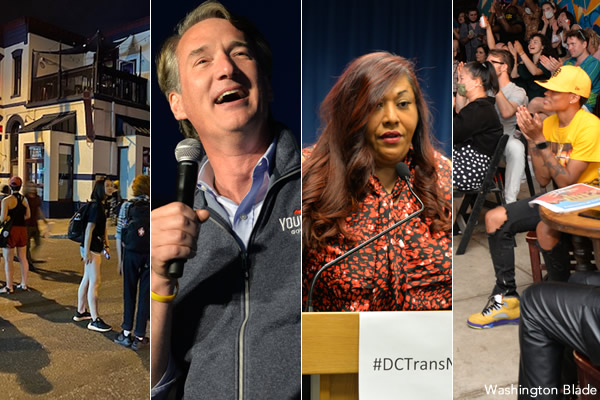
#10: Gay Asian man, parents assaulted in Northwest

A gay Asian man and his parents were treated and released from a local hospital after they were attacked and assaulted on Aug. 7 on a street near the Washington National Cathedral by a male assailant who shouted homophobic and anti-Asian slurs, according to D.C. police and court records.
Charging documents filed in D.C. Superior Court state that D.C. police, who arrived on the scene a short time after the attack, arrested D.C. resident and American University graduate student Patrick Trebat, 38, on one count of felony assault, two counts of simple assault, and one count of destruction of property. The charging document says Trebat allegedly damaged the cell phone of Sean Lai, 30, an out gay man of Chinese ancestry, as he allegedly punched and kicked Lai and Lai’s elderly parents on the 3700 block of Fulton St., N.W. while shouting the words “faggots” and “You’re not Americans.”
Prosecutors with the U.S. Attorney’s Office changed the charges to two counts of felony assault with significant bodily injury and listed the incident as an anti-Asian bias related crime. American University in October announced Trebat was no longer a student at the school.
#9: D.C., Md, Va. pass laws banning panic defense
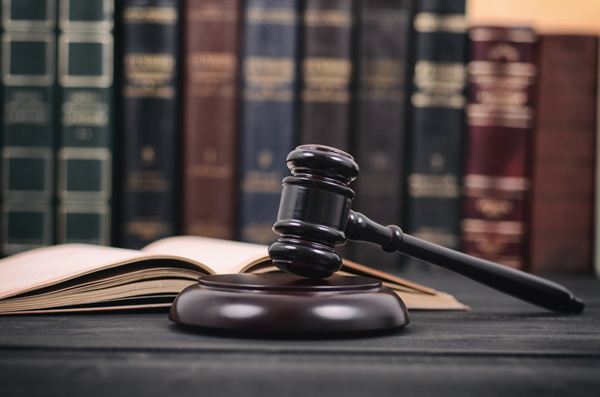
The D.C. Council and the Maryland and Virginia General Assemblies each passed their own laws in 2021 banning the use of the so-called LGBTQ panic defense in criminal trials.
LGBTQ rights organizations and legal experts have said attorneys representing defendants charged with committing violent crimes against LGBTQ people, including murder, have used the panic defense to confuse juries into finding them not guilty by arguing that their clients committed an act of violence against an LGBTQ person in a form of self-defense in a state of “panic” after they learned that the victim was an LGBTQ person. Supporters of banning the defense say it improperly places the blame for a violent act on the LGBTQ victim.
D.C. Mayor Muriel Bowser (D) and Virginia Gov. Ralph Northam (D) signed the legislation banning the panic defense after expressing strong support for the measures. Maryland Gov. Larry Hogan (R) declined to sign the Maryland bill but announced he would allow the bill to become law without his signature.
#8: Gay men arrested under Md. sodomy law in bookstore raid

Harford County, Md., Sheriff’s Office deputies arrested four men on a charge of Perverted Sexual Practice under the Maryland sodomy law during a May 20 raid on the Bush River Books & Video store in the town of Abington, located 25 miles north of Baltimore.
Four other men were charged with indecent exposure, and another was charged with solicitation for prostitution for a total of nine arrests during the May 20 raid that was prompted by complaints from nearby residents, according to a statement released by the Sheriff’s Office.
An attorney with the LGBTQ litigation group Lambda Legal said the sodomy arrests appeared to be a violation of the U.S. Supreme Court’s 2003 ruling declaring state sodomy laws unconstitutional. Lambda attorney Greg Nevins said that although the Supreme Court ruling does not cover acts of sodomy committed in public places, the men arrested in the May 20 raid engaged in alleged consenting sexual acts in a locked video booth, which Sheriff’s deputies unlocked after obtaining keys from a bookstore employee. He said it would be up to a judge to decide whether the video booths could be considered a private space as argued by attorneys representing the arrested men, who were released while awaiting court appearances.
The bookstore raid, meanwhile, drew attention to a little noticed development that the Maryland General Assembly in 2020 repealed only one of Maryland’s two antiquated sodomy statutes, the one outlawing anal sex. At the request of conservative Republican lawmakers, the General Assembly left in place Maryland’s Unnatural or Perverted Sexual Practice Act, which outlaws oral sex. LGBTQ supportive Maryland House of Delegates Member David Moon (D-Montgomery County) said he plans to introduce a bill in 2022 to repeal that statute.
#7: Loudoun County schools’ trans nondiscrimination policy under fire
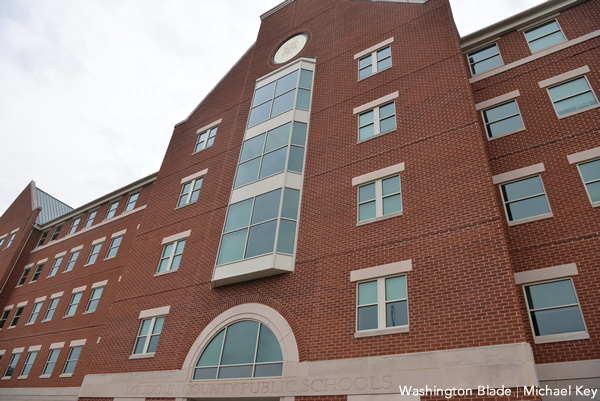
The Loudoun County, Va., public school system’s policy of allowing students to use the bathroom or locker room that matches their gender identity came under fire in October after news surfaced that a 15-year-old “gender fluid” boy allegedly sexually assaulted two girls in different high schools.
Law enforcement officials said one of the assaults allegedly occurred on May 28 in the girl’s bathroom at Stone Bridge High School in Ashburn, Va., while the boy was dressed in a skirt. The other assault allegedly occurred on Oct. 6 in a vacant classroom at Broad Run High School, also in Ashburn, after the boy was transferred there while facing charges for the first assault.
“The sexual assault on our daughter and the subsequent sexual assault by the same individual were both predictable and preventable,” the parents of the girl involved in the first alleged assault said in a statement released by their attorney. “Subsequent to the sexual assault on our daughter, Loudoun County Public Schools formalized the policy regarding restroom use that was easily exploitable by a potential sexual assailant,” the parents’ statement says.
The LGBTQ advocacy group Equality Loudoun released its own statement saying sexual assault cases should be prosecuted to the fullest extent of the law regardless of the sexual orientation or gender identity of the perpetrator. However, the group said allegations that the perpetrator of the two school assaults was transgender or genderfluid had not been verified. “Attempts to shift the blame of this incident to any individual, group, or policy – other than the alleged perpetrator – does a grave disservice to the victims of these crimes and already marginalized youth in our community,” the Equality Loudoun statement says.
#6: Supreme Court upholds Va. trans rights ruling

The U.S. Supreme on June 28 refused to hear an appeal by the Gloucester County, Va., School Board challenging a lower court ruling that transgender former high school student Gavin Grimm had a legal right to use the men’s bathroom at his high school. The high court’s decision not to hear the case leaves in place U.S. district court and U.S. appeals court rulings declaring the school board violated federal law and the Equal Protection Clause of the U.S. Constitution by prohibiting Grimm from using the same bathrooms as other boys and forcing him to use separate bathrooms. The ACLU, which represented Grimm in his more than five-year legal battle that continued after his high school graduation, called the development a major victory for the rights of trans students.
Four months after the Supreme Court’s action, the Gloucester School Board agreed to settle the case by paying Grimm $1.3 million to cover attorney’s fees that the ACLU says the school board is responsible for.
#5: Casa Ruby shakeup
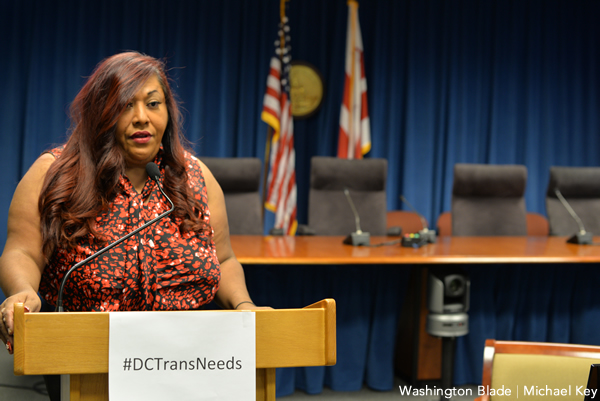
Ruby Corado, the founder and executive director of D.C.’s LGBTQ community services center Casa Ruby, announced in a Facebook live broadcast in October that she had resigned from her executive director’s position. Corado stated in her broadcast that her resignation was in response to an ongoing dispute with the D.C. government that resulted in a decision by the city one week earlier to discontinue an $850,000 annual city grant to fund Casa Ruby’s emergency low barrier shelter for homeless LGBTQ youth and adults.
Corado called the decision by the D.C. Department of Human Services not to renew the grant for fiscal year 2022 an act of retaliation based, in part, on what she says was her refusal to agree to a request by the city agency to move the Casa Ruby shelter to a neighborhood unsafe for trans women and LGBTQ youth. The DHS has declined to disclose its reason for ending the grant, saying only that it has arranged for other LGBTQ supportive organizations to carry out LGBTQ-related homeless services.
Longtime D.C. transgender rights advocate Alexis Blackmon, who had been serving as Casa Ruby’s Government Affairs Director, was named the organization’s interim executive director. Corado said that, following a six-month sabbatical, she plans to organize fundraising efforts to support Casa Ruby’s programs independent of D.C. government funding.
#4: GOP victories in Va. could endanger LGBTQ rights
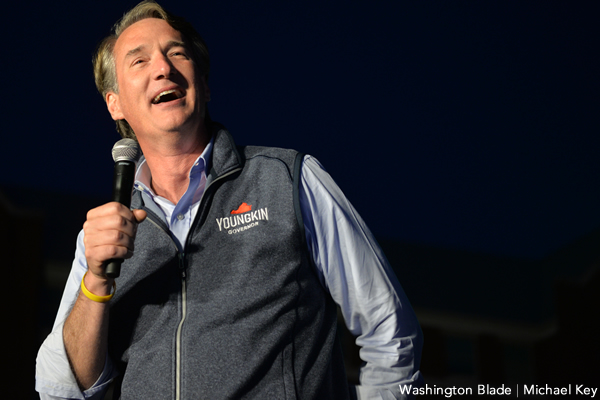
The close but decisive wins in the November election in Virginia by Republicans Glenn Youngkin as governor, Winsome Sears as lieutenant governor, and Jason Miyares as attorney general and Republicans winning control of the Virginia House of Delegates raises questions about whether the recent sweeping advances in LGBTQ rights in Virginia put in place by the outgoing Democratic Gov. Ralph Northam, and the Democratic-controlled General Assembly could be in jeopardy.
Youngkin, who defeated Democratic candidate and former Virginia Gov. Terry McAulliffe, expressed opposition to nondiscrimination protections enacted by the Democratic-controlled General Assembly in 2020 for transgender and nonbinary students in the state’s public schools. He has also expressed opposition to same-sex marriage while saying he would not likely take steps to repeal the legal standing of marriage equality.
But of greatest concern among Virginia’s LGBTQ activists is Attorney General-elect Miyares’s voting record on LGBTQ issues in his role as a member of the state’s House of Delegates from the Virginia Beach area since 2016. Since Democrats took control of the legislature in January 2020, Miyares has voted against nearly all of the LGBTQ supportive bills passed during that time, including bills adding LGBTQ people to the state’s anti-discrimination law, adding LGBTQ people to the state’s hate crimes law, banning the use of the so-called LGBTQ panic defense in criminal trials, restricting the use of conversion therapy for minors, and repealing the state’s longstanding but unenforceable statute banning same-sex marriage.
With Democrats retaining control of the Virginia Senate, Republican elected officials hostile to LGBTQ rights cannot — without the unlikely defection of Democratic lawmakers — repeal these and other LGBTQ supportive laws in the state. But activists have expressed concern that, as attorney general, Miyares might be in a position to curtail the enforcement of the LGBTQ supportive laws.
Among the few positive outcomes of the Virginia election, according to LGBTQ activists, was that the three openly LGBTQ members of the House of Delegates, each of whom are Democrats, won re-election, including Danica Roem of Manassas, who is the first openly trans person to be seated in any state legislature in the U.S.
#3: LGBTQ books removed, reinstated in Fairfax schools

The Fairfax County, Va., Public Schools announced in November that it had returned two LGBTQ-themed books to the libraries of the school system’s high schools after temporarily removing the books in response to objections from some parents who claimed they included sexually explicit content inappropriate for students.
The two books, “Lawn Boy,” a novel by author Jonathan Evison, and “Gender Queer: A Memoir,” an autobiography by non-binary author Maia Kobabe, were deemed to be important works of literature suitable to young adults following a thorough review by two school system committees, according to an announcement by Fairfax Public Schools officials. The officials said that although the books include descriptions of sexual acts, they do not constitute pornography and do not promote pedophilia as claimed by some parents and others opposing the books.
The decision to reinstate the books “reaffirms Fairfax Public Schools’ ongoing commitment to provide diverse reading materials that reflect our student population, allowing every child an opportunity to see themselves reflected in literary characters,” a statement by school officials says.
News of the controversy surrounding the two books in the Fairfax County school libraries triggered efforts by conservative groups to ban LGBTQ-themed books in other school districts throughout the country.
#2: D.C. LGBTQ bars and events rebound as COVID restrictions eased
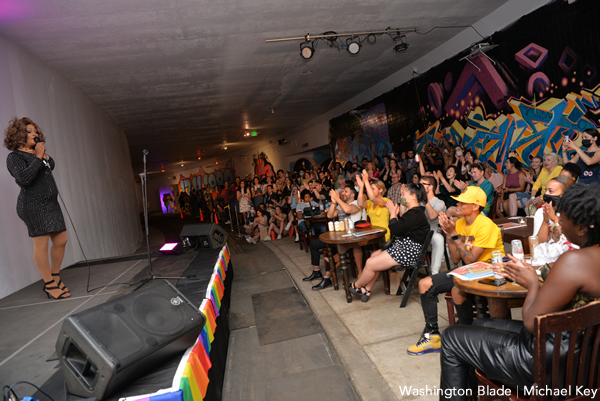
Owners of the city’s gay bars and LGBTQ friendly bars and restaurants joined nightlife businesses across the city in rejoicing over D.C. Mayor Muriel Bowser’s announcement in May that restaurants and bars could resume operations at full capacity and return to pre-pandemic operating hours on May 21.
The mayor’s announcement followed what nightlife businesses said was severe financial hardship caused by the earlier full business shutdowns due to COVID public health restrictions followed by a partial reopening with strict limits of only 25 percent of the normal number of customers inside bars and restaurants and a ban on standing in bars or sitting at bar stools.
The lifting of the bar, restaurant and other nightlife business restrictions in May was followed by the city’s decision to lift all restrictions on indoor and outdoor events on June 11. That cleared the way for D.C.’s Capital Pride Alliance to organize several scaled back LGBTQ Pride events, including a June 12 Pride Walk, which began at Dupont Circle and traveled to Freedom Plaza, where a rally was held. The Walk drew widespread attention when U.S. Vice President Kamala Harris and her husband joined the walk as it approached Freedom Plaza.
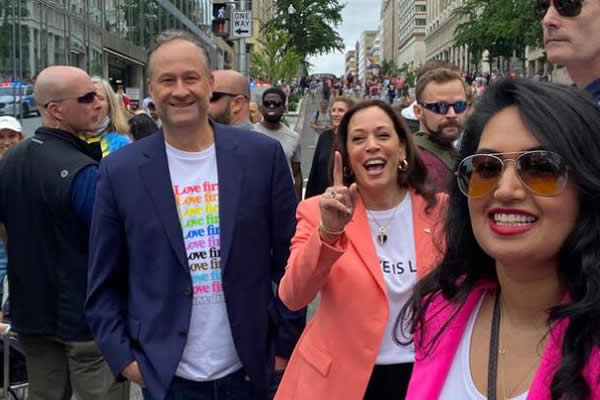
The enthusiasm over the full reopening of LGBTQ nightlife venues, especially the bars, became evident with long lines of patrons waiting to get into some of the bars that were filled to capacity.
#1: Nellie’s hit with protests after Black woman dragged down stairs
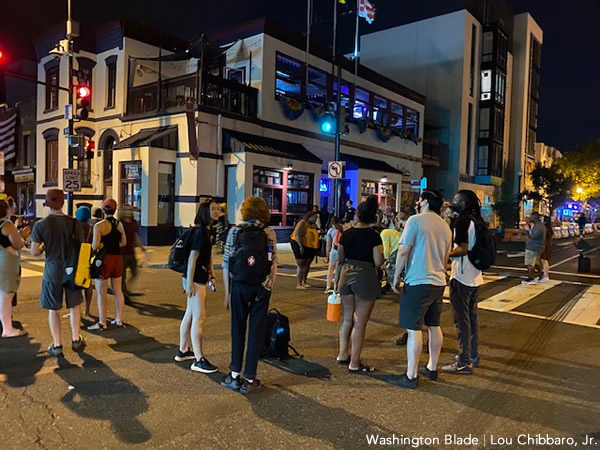
A June 13 incident in which a black woman was dragged down a flight of stairs by a security guard during a brawl that broke out at the D.C. gay bar Nellie’s Sports Bar led to a boycott and months of protests against the bar, an investigation into the incident by the city’s liquor board, and charges by some LGBTQ activists that Nellie’s and other D.C. gay bars had racially biased policies and practices.
The action by the security guard was captured on video taken by one of the customers on their phone that went viral on social media, prompting LGBTQ activists and Black Lives Matter organizers to demand that Nellie’s take appropriate action to review its security procedures. Nellie’s issued an apology for the incident the following day and announced it had fired the private security company whose employee, who is Black, dragged college student Keisha Young, 22, down the stairs. Nellie’s also announced it would temporarily close for business to assess what happened and develop plans to reopen as a safer space for all members of the community.
After two months of staging Friday night protests outside Nellie’s from June through most of August, protest leaders announced at a community meeting that they would discontinue the protests but continue to ask the community to boycott Nellie’s.
Nellie’s reopened 35 days after its self-imposed closing. But on Oct. 20, the D.C. Alcoholic Beverage Control Board, following an investigation into the June 13 incident, approved a compromise agreement with Nellie’s that called for Nellie’s to pay a $5,000 fine and serve a seven-day license suspension for violations that liquor board investigations found had occurred in Nellie’s handling of the fight on its premises that led to Young being dragged down the stairs.
An order issued by the ABC Board said the license suspension would take place from Dec. 20-26 of this year.
Virginia
Va. activists preparing campaign in support of repealing marriage amendment
Referendum about ‘dignity and equal protection under the law’

Virginia voters in November will vote on whether to repeal their state’s constitutional amendment that defines marriage as between a man and a woman.
Democratic Gov. Abigail Spanberger on Feb. 6 signed House Bill 612 into law. It facilitates a referendum for voters to approve the repeal of the 2006 Marshall-Newman Amendment. Although the U.S. Supreme Court’s Obergefell ruling extended marriage rights to same-sex couples across the country in 2014, codifying marriage equality in Virginia’s constitution would protect it in the state in case the decision is overturned.
Maryland voters in 2012 approved Question 6, which upheld the state’s marriage equality law, by a 52-48 percent margin. Same-sex marriage became legal in Maryland on Jan. 1, 2013.
LGBTQ advocacy groups and organizations that oppose marriage equality mounted political campaigns ahead of the referendum.
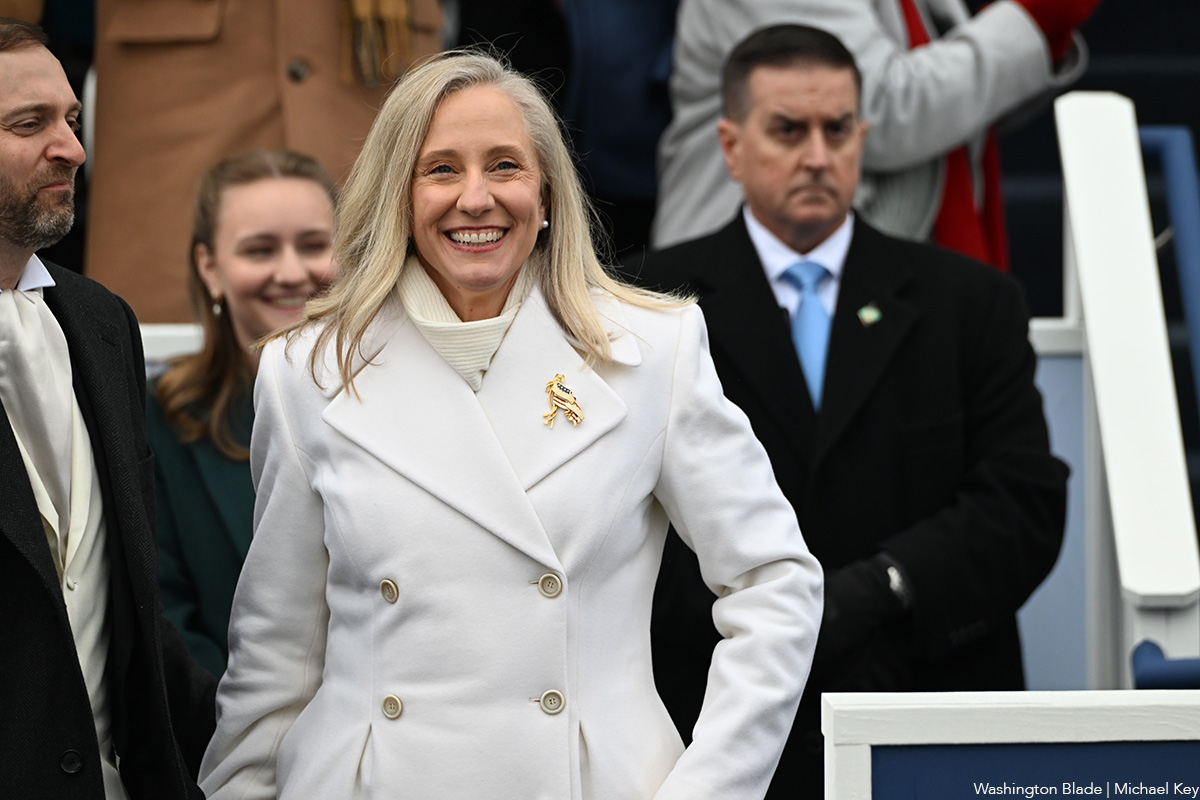
Equality Virginia has been involved in advancing LGBTQ rights in Virginia since 1989.
Equality Virginia is working under its 501c3 designation in conjunction with Equality Virginia Advocates, which operates under a 501c4 designation, to plan campaigns in support of repealing the Marshall-Newman Amendment.
The two main campaigns on which Equality Virginia will be focused are education and voter mobilization. Reed Williams, the group’s director of digital engagement and narrative, spoke with the Washington Blade about Equality Virginia’s plans ahead of the referendum.
Williams said an organization for a “statewide public education campaign” is currently underway. Williams told the Blade its goal will be “to ensure voters understand what this amendment does and why updating Virginia’s constitution matters for families across the commonwealth.”
The organization is also working on a “robust media and voter mobilization campaign to identify and turn out voters” to repeal Marshall-Newman Amendment. Equality Virginia plans to work with the community members to guarantee voters are getting clear and accurate information regarding the meaning of this vote and its effect on the Virginia LGBTQ community.
“We believe Virginia voters are ready to bring our constitution in line with both the law and the values of fairness and freedom that define our commonwealth,” said Equality Virginia Executive Director Narissa Rahaman. “This referendum is about ensuring loving, committed couples and their families are treated with dignity and equal protection under the law.”
The Human Rights Campaign has also worked closely with Equality Virginia.
“It’s time to get rid of outdated, unconstitutional language and ensure that same sex couples are protected in Virginia,” HRC President Kelley Robinson told the Blade in a statement.
District of Columbia
D.C. police arrest man for burglary at gay bar Spark Social House
Suspect ID’d from images captured by Spark Social House security cameras

D.C. police on Feb. 18 arrested a 63-year-old man “of no fixed address” for allegedly stealing cash from the registers at the gay bar Spark Social House after unlawfully entering the bar at 2009 14th St., N.W., around 12:04 a.m. after it had closed for business, according to a police incident report.
“Later that day officers canvassing for the suspect located him nearby,” a separate police statement says. “63-year-old Tony Jones of no fixed address was arrested and charged with Burglary II,” the statement says.
The police incident report states that the bar’s owner, Nick Tsusaki, told police investigators that the bar’s security cameras captured the image of a man who has frequently visited the bar and was believed to be homeless.
“Once inside, the defendant was observed via the establishment’s security cameras opening the cash register, removing U.S. currency, and placing the currency into the left front pocket of his jacket,” the report says.
Tsusaki told the Washington Blade that he and Spark’s employees have allowed Jones to enter the bar many times since it opened last year to use the bathroom in a gesture of compassion knowing he was homeless. Tsusaki said he is not aware of Jones ever having purchased anything during his visits.
According to Tsusaki, Spark closed for business at around 10:30 p.m. on the night of the incident at which time an employee did not properly lock the front entrance door. He said no employees or customers were present when the security cameras show Jones entering Spark through the front door around 12:04 a.m.
Tsusaki said the security camera images show Jones had been inside Spark for about three hours on the night of the burglary and show him taking cash out of two cash registers. He took a total of $300, Tsusaki said.
When Tsusaki and Spark employees arrived at the bar later in the day and discovered the cash was missing from the registers they immediately called police, Tsusaki told the Blade. Knowing that Jones often hung out along the 2000 block of 14th Street where Spark is located, Tsusaki said he went outside to look for him and saw him across the street and pointed Jones out to police, who then placed him under arrest.
A police arrest affidavit filed in court states that at the time they arrested him police found the stolen cash inside the pocket of the jacket Jones was wearing. It says after taking him into police custody officers found a powdered substance in a Ziploc bag also in Jones’s possession that tested positive for cocaine, resulting in him being charged with cocaine possession in addition to the burglary charge.
D.C. Superior Court records show a judge ordered Jones held in preventive detention at a Feb. 19 presentment hearing. The judge then scheduled a preliminary hearing for the case on Feb. 20, the outcome of which couldn’t immediately be obtained.
District of Columbia
Judge rescinds order against activist in Capital Pride lawsuit
Darren Pasha accused of stalking organization staff, board members, volunteers

A D.C. Superior Court judge on Feb.18 agreed to rescind his earlier ruling declaring local gay activist Darren Pasha in default for failing to attend a virtual court hearing regarding an anti-stalking lawsuit brought against him by the Capital Pride Alliance, the group that organizes D.C.’s annual Pride events.
The Capital Pride lawsuit, initially filed on Oct. 27, 2025, accuses Pasha of engaging in a year-long “course of conduct” of “harassment, intimidation, threats, manipulation, and coercive behavior” targeting Capital Pride staff, board members, and volunteers.
In his own court filings without retaining an attorney, Pasha has strongly denied the stalking related allegations against him, saying “no credible or admissible evidence has been provided” to show he engaged in any wrongdoing.
Judge Robert D. Okum nevertheless on Feb. 6 approved a temporary stay-away order requiring Pasha to stay at least 100 feet away from Capital Pride’s staff, volunteers, and board members until the time of a follow-up court hearing scheduled for April 17. He reduced the stay-away distance from 200 yards as requested by Capital Pride.
In his two-page order issued on Feb. 18, Okun stated that Pasha explained that he was involved in a scooter accident in which he was injured and his phone was damaged, preventing him from joining the Feb. 6 court hearing.
“Therefore, the court finds there is a good cause for vacating the default,” Okun states in his order.
At the time he initially approved the default order at the Feb. 6 hearing that Pasha didn’t attend, Okun scheduled an April 17 ex parte proof hearing in which Capital Pride could have requested a ruling in its favor seeking a permanent anti-stalking order against Pasha.
In his Feb. 18 ruling rescinding the default order Okun changed the April 17 ex parte proof hearing to an initial scheduling conference hearing in which a decision on the outcome of the case is not likely to happen.
In addition, he agreed to consider Pasha’s call for a jury trial and gave Capital Pride 14 days to contest that request. The Capital Pride lawsuit initially called for a non-jury trial by judge.
One request by Pasha that Okum denied was a call for him to order Capital Pride to stop its staff or volunteers from posting information about the lawsuit on social media. Pasha has said the D.C.-based online blog called DC Homos, which Pasha claims is operated by someone associated with Capital Pride, has been posting articles portraying him in a negative light and subjecting him to highly negative publicity.
“The defendant has not set forth a sufficient basis for the court to restrict the plaintiff’s social media postings, and the court therefore will deny the defendant’s request in his social media praecipe,” Okun states in his order.
A praecipe is a formal written document requesting action by a court.
Pasha called the order a positive development in his favor. He said he plans to file another motion with more information about what he calls the unfair and defamatory reports about him related to the lawsuit by DC Homos, with a call for the judge to reverse his decision not to order Capital Pride to stop social media postings about the lawsuit.
Pasha points to a video interview on the LGBTQ Team Rayceen broadcast, a link to which he sent to the Washington Blade, in which DC Homos operator Jose Romero acknowledged his association with Capital Pride Alliance.
Capital Pride Executive Director Ryan Bos didn’t immediately respond to a message from the Blade asking whether Romero was a volunteer or employee with Capital Pride.
Pasha also said he believes the latest order has the effect of rescinding the temporary stay away order against him approved by Okun in his earlier ruling, even though Okun makes no mention of the stay away order in his latest ruling. Capital Pride attorney Nick Harrison told the Blade the stay away order “remains in full force and effect.”
Harrison said Capital Pride has no further comment on the lawsuit.

















